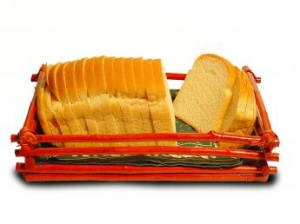
Another adage: “The greatest thing since sliced bread,” implies a similar kind of automatic acceptance that may have been true of consumers, but not bakeries. There was actually considerable resistance and skepticism of the new invention. Bakeries thought sliced bread would grow stale more quickly, and that uniformly thin slices might make customers more efficient in how they consumed bread—reducing bread sales. To some, it sounded so trivial and unnecessary. (Is hand slicing bread really that much work for anyone anyway?)
It was a friend of the bread slicing machine’s inventor, a friend who owned a bakery in Chillicothe,Missouri, who first gave the new bread slicing machine a try. That was 1928 and within five years sales of sliced bread exceeded sales of un-sliced bread. It turned out that because it was already sliced, consumers tended to eat more bread more frequently, increasing not only bread sales but sales of jam, and boosting sales of another new invention, the automatic pop-up toaster. The whole bread ecosystem shifted.
Sliced bread even encountered regulatory resistance when in 1943 it was banned by the federal government. That’s right, banned…as a wartime conservation measure. This was supposedly because it required a heavier wrapper than un-sliced bread amid tight supplies of waxed paper. Compliance was predictably uneven and the ban was lifted within just a few months.
As someone who embraces innovation, it pains me to say it but apparently some things don’t change, at least not very much. Winning acceptance of any new idea is far from automatic. Those who are in a position to enable or obstruct an innovation often stand in the way, sometimes predicting dire consequences, even when the end-user is destined to embrace it. And, there’s always the risk of government interference despite acceptance in the marketplace.
When we’re tempted to think of some new idea as, “The greatest thing since sliced bread,” we should realize that that thing we’re referring to may in fact be not only the greatest ‘convenience” for consumers, but also the greatest “challenge” for us, and the greatest perceived “threat” by others.
It makes me wonder how many other great innovations are languishing somewhere because the innovator wasn’t able to overcome that initial resistance and find the acceptance waiting on the other side. If someone ever finds a fool-proof way to gain timely acceptance of great new ideas, that might be the greatest thing since sliced bread.
Get the new Special Report, Innovation Essentials: The Four Greatest Ways We stop Ourselves…In Business and in Life. Download a free copy at: http://www.insightfusion.com/SpecialReport.asp

Leave A Comment